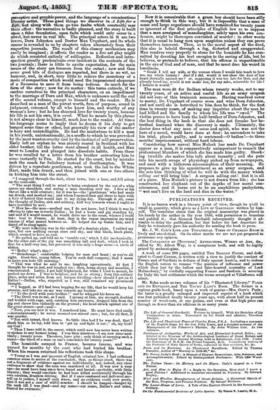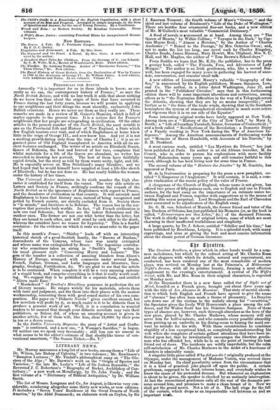PUBLICATIONS RECEIVED.
It is no barren work in a literary point of view, though its yield be; small in quantity, which gives us a Lira OF GARTRA.LDI written by him- self. The translator states that the original manuscript was placed in his hands by the author in the year 1850, with permission to translate. and publish it ; that General Garibaldi subsequently thought it ad-. viable to delay the publication, but that before his last departure for Italy he voluntarily gave his authority for sending the book to press.
Mr. J. W. COle'S LIFE AND THEATRICAL. TIMES OF CHARLES KEAN is lively and anecdotical. On its other merits we are not yet prepared to pronounce any opinion.
The CATALOGUE OF[SCOTTISH] CODFISH] ANTIQUITTES, WORKS OF ART, edited by Mr. Albert ay, is a sumptuous book, and will be highly prized by archaeologists.
A work of some 200 pages, entitled THE ITALIAN CAUSE, and dedi- cated to Count Cavour, is written with a view to justify the conduct of France and of Sardinia in defence of Italy against Austria, and to induce- the English nation to resume "the position of influence and power which they lost by the hollow and false-hearted neutrality of Lord• Malmesbury," by cordially supporting France and Sardinia in securing, for Italy the best settlement which the terms arranged at Villafranca will admit.
Mr. Bohn sends us two volumes of his "Illustrated Library," PARA AND rrs EicvutoNs, and THE YOUNG LADY'S BOOK. The former is a copious guide-book, based upon a work of genius—Mrs. Gore's Paris ; the latter is a greatly enlarged and improved reprint of a book which was first published nearly twenty years ago, with about half its present number of wood-cuts, at one guinea, and even at that high price ran through no fewer than six editions in as many years.
Boons.
771c Life of General Garibaldi. Written by himself. With his Sketches of hie Companions in Arms. Translated by his friend and admirer, Theodore Dwight.
The Life and Theatrical notes of Charles Kean, F.S.A. Including a summary of the English Stage for the last Fifty Years, and a detailed amount of the Management of the Princess's Theatre. By John William Cole. In twe volumes.
Catalogue of Antiquities, lrorks of Art, and Historical Scottish Relic s ; ex- hibited in the Museum of the Arehreological Institute of Great Britain and Ireland during their Annual Meeting, held in Edinburgh, July 1856. tinder the Patronage of H.R.H. the Prince Consort, K.G. Comprising notices of the Portraits of Mary Queen of Scots, collected on that occasion, he. he. Paris and its Environs. An Illustrated Handbook. Edited by Thomas Forester, Author of "Norway in 1848-49," he.
The Young Lady's Book ; A Manual of Elegant Recreations, Arts, Sciences, and Accomplishments. Edited by Distinguished Professors. With 1200 Wood- cuts.
The Italian Cause : its History and its Hopes. Italy's Appeal to a Free Nation.
Art, and Hoer to Enjoy It : a Reply to the Question, how shall I know a good Picture 7 Addressed to Amateurs interested in Painting. By Edward Hopley. If and Woollen Manufactures of Great Britain. A Historical Sketch of the Rise, Progress, and Present Position. By Samuel Brothers. The Lazar-House of Leros. A Tale of the Eastern Church in the Seventeenth Century. Os The Fundamental Doctrine of Latin Syntax. By Simon S. Lewis, M.& The Child's Guide to a Knowledge of the English Constitution, with a short account of its Rise and Progress. Arranged in simple language, in the form of Question and Answer, for the use of Young Persons. By a Gentleman.
Wreck and Ruin : or Modern Society. By Kinehan Cornwallis. Three volumes.
A Wife's Home Duties : containing Practical Hints fur inexperienced House- keepers.
NEW EDITIONS.
The Braro. A Tale. By J. Fenimore Cooper. Illustrated from Drawings. By F. 0. C. Barley. Temptation and Atonement. A Tale. By Mrs. Gore.
The Diamond and the Pearl. A Novel. By Mrs. Gore. A new edition, re- vised by the author.
A Hundred Short Tales for Children. From the German of C. von Schmid. By F.-B. Wells, M.A., Rector of Woodchurch, Kent. Third edition.
The Warden. By Anthony Trollope. Author of " Barchester Towers," "The Three Clerics," &c. New edition.
The Herat History of Great Britain, from the Declaration of War by France in 1793 to the Accession of George IV. By William James. A new edition, with Additions and Notes. In six volumes. Volume IV.
PERIODICALS FOR AUGUST.
Assuredly "it is important for us in these islands to know, as cor- rectly as we can, the contemporary history of France ; " so says the North British Review, and with no less truth it adds that about nothing do we know less than about the origin of facts that have occurred in France during the last forty years, because we will persist in applying to our neighbours and their doings the most absurdly, exclusively John Bullish criterions. Hence we never see them as they really are. These remarks are made in a review of M. Guizot's Memoirs, which is full of matter apposite to the present time. It is a serious fact for France's neighbours that her people are retrograding in civilization. Of the other articles in the present number of the North British, the most notable is one on the Provincial Life and History of New England, a State which few English tourists ever visit, and of which Englishmen at home knew little in the reign of George III., and now know less. - And yet it is not a seedling growth dating only from the time of Charles I. ; it is an or- ganized piece of Old England transplanted to America with all its an- cient features unchanged. The writer of an article on Elizabeth Stuart, Queen of Bohemia, the best and bravest of her race, complains that whilst materials for a life of the Queen are abundant, no writer has succeeded in drawing her portrait. The best of them have faithfully copied details, but the story as told by them wants unity, light, and life. He is especially severe on Miss Strickland's many blunders ; and we had hoped that he would himself have supplied at least a life-like sketch of Elizabeth ; but he has not done so. He has nearly hidden the woman under the history of her times.
The Universal Review maintains in its sixth number the high cha- racter it established for itself from the outset. The very able article on Letters and Society in France, strikingly confirms the remark of the North British as to the ignorance of Englishmen with regard to France, and the decadence of civilization in that country. It will astonish most Englishmen to learn that literary men, instead of being recognized and petted by French society, are strictly excluded from it. Society there is "le monde," and literature is la Bohome. The reason lies in the cor- ruption that pervades both worlds. In fact, " all French civilization is now one vast Bohemia ; but there are the indoor Bohemians and the outdoor ones. The former are not one whit better than the latter, but they are bound to each other, and will stand by each other to the death, whereas the outsiders have no reason for hypocrisy." This is a fearful revelation : for the evidence on which it rests we must refer to the paper itself.
In this month's Fraser, " Shirley" leads off with an interesting historical sketch of a great Scottish family, the "Barons of Buchan," descendants of the Comyns, whose race was nearly extirpated and whose name was extinguished by Bruce. The ingenious contribu- tor who sometimes takes an airing in "Smith's drag" writes in his usual pleasant style " Concerning Hurry and Leisure." The gem of the number is a collection of amazing blunders from Alison's History of Europe, arranged with comments under several heads, French, Italian, German, and Latin languages and literature, Geo- graphy, Geology, Fortification, &e. We are glad to see that the article is to be continued. When complete it will be a very amusing epitome of a stupid book, and comprise everything in it that is really worth read- ing. We suggest that it be published in a separate form, and entitled "Alison made Easy."
" Monkshood " of Bentley's Miscellany possesses in perfection the art of literary mosaic. He ranges widely for his materials, selects them with taste and judgment, and fits them into their places with the neatest workmanship, cementing them with good sound matter of his own com- position. His paper on "Didactic Novels" gives excellent counsel, but few novelists will profit by it, so much easier is it to be didactic than to produce a genuine work of art. Well, it is a consolation to wearied readers to be assured that though your didactic novelists may ruin their publishers, as Balzac did, of whom an amusing account is given in another article, few of them will, like him, clear 18,0001. by their pens in ten or a dozen years.
• In the Dublin University Magazine the story of "Artist and Crafts- man" is continued, and a new one, "A Woman's Sacrifice," is begun. Of neither can we speak very favourably • still less can we concur in what seems to be the editor's estimate of ihat shoddylike tissue of con- ventional smartness, "The Season Ticket —No. V."



























 Previous page
Previous page